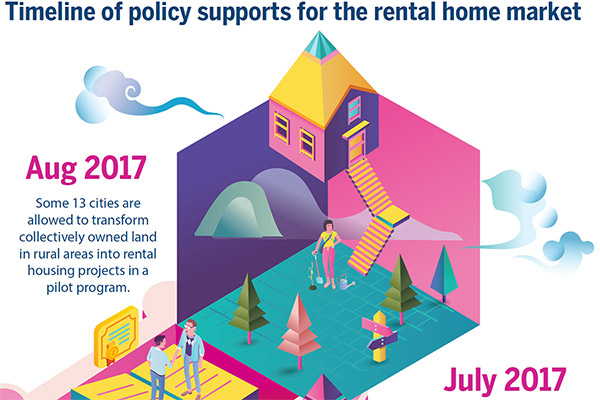Realty is back on terra firma
For many property owners in Shanghai, the downtrend in both rentals and home sale prices this year is quite different from that of previous years.
That is not good news.
With higher supplies in the rental market and sloppy transactions in the preowned property market, average price of pre-owned properties in Shanghai dropped from 52,640 yuan ($7,856) per square meter in January to 50,674 yuan per sq m this month.
During the same period, rentals dropped by somewhere between 200 yuan per month and 1,000 yuan per month, depending on the home size and location.
Rents vary greatly from 1,500 yuan per month to more than 30,000 yuan per month, according to anjuke.com, an online property services provider.
When the home price is not rising, those who would sell properties now turn to lease out their properties, which increases rental supplies and lowers prices, said a research note of Centaline Property.
Some property owners said they are still going to sell properties based on their calculations and comparisons of yields.
"If I sell my property at the average price, I can have about 7 million yuan, and annual yield could be above 260,000 yuan if I put it in wealth management products," said Peng Shanlin, a 67-year-old property owner in Shanghai. "But if I lease it, rental income would be about 84,000 yuan."
Real estate agents said that increasing number of property owners are thinking of selling properties and invest the money in other assets.
"Home price growth in several key cities this year is already lower than that of many wealth management products, and low return rate of leasing out properties is not attractive," said Tao Yongliang, a real estate agent with Zhonghuan Property, Shanghai.
Average yield of wealth management products offered through bank channels is above 4 percent, home price growth is negative, while the yield of leasing out a property is below 2 percent in Shanghai.
"If you do the calculation, you would realize that a spare apartment is no longer an asset that will generate a relatively high yield. If the policies of making housing prices stable are continued for the next few years, more property owners would consider shifting their wealth from property to other assets," said Tao.
Yan Yuejin, research director with E-house China R&D, a property industry information provider, said cities where home price growth has slowed have affected investor sentiment.
"This is a good trend that makes residential properties serve their original purpose-that of providing a place to live in," he said.
Zhang Dawei, an analyst with Centaline Property in Beijing, said in a research note that in the remaining part of this year, key cities such as Beijing and Shanghai would see the average home price growth stay low.
Speculative demand still exists, which is spilling over to lower-tier cities located near key cities, said Zhang.
But investing in residential properties in cities that do not have a solid foundation for population growth and employment growth could be risky, said Yan.



















